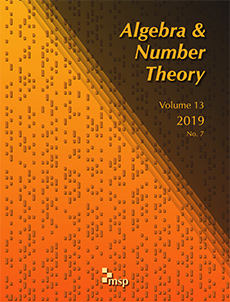Abstract
In this paper we study algebraic and asymptotic properties of generating sets of algebras over orders in number fields. Let be an associative algebra over an order in an algebraic number field. We assume that is a free -module of finite rank. We develop a technique to compute the smallest number of generators of . For example, we prove that the ring admits two generators if and only if . For a given positive integer , we define the density of the set of all ordered -tuples of elements of which generate it as an -algebra. We express this density as a certain infinite product over the maximal ideals of , and we interpret the resulting formula probabilistically. For example, we show that the probability that random matrices generate the ring is equal to , where is the Riemann zeta function.
Citation
Rostyslav V. Kravchenko. Marcin Mazur. Bogdan V. Petrenko. "On the smallest number of generators and the probability of generating an algebra." Algebra Number Theory 6 (2) 243 - 291, 2012. https://doi.org/10.2140/ant.2012.6.243
Information





